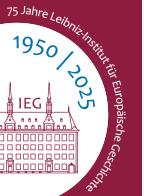About
The Leibniz Institute of European History (IEG)
The Leibniz Institute of European History (IEG) in Mainz is a non-profit institution devoted to academic research that is not part of a university. It is an independent research institute and it has been a member of the Leibniz Association since 2012. Its purpose is to conduct academic research on European history. The Institute fulfils this purpose through the individual and joint research efforts of its staff and through the research scholarships and fellowships that it awards to academics both from Germany and abroad.
Foundation Responsibilities Funding
Foundation
The IEG owes its foundation in 1950 to the international dialogue between historians in the aftermath of the Second World War, during which German and French participants in particular called for lasting cooperation within Europe. Their aim was to help to overcome prejudices and to contribute to better understanding between the European peoples through more in-depth understanding of the unique characteristics, commonalities and interrelations in the historical development of the different religions and nations.
Responsibilities
Today, the Institute’s charter defines the primary goals of the IEG as follows: "Research on the religious and intellectual traditions of Europe, their development and crises, and particularly on religious differences, their effects and the possibilities of overcoming these differences", and "Europe-focused fundamental research which assists the historical understanding of the process of the coalescence of Europe and the individual historical paths of the European states and peoples".
In accordance with its charter, IEG pursues these goals through:
- its own research projects conducted by staff members individually or jointly with other academics from Germany and abroad
- the funding it provides to young postgraduate researchers from Europe and the other continents, who work on research projects on European history and who live at the Institute as fellows and scholarship holders
- collaboration with other institutions in Germany and abroad that pursue similar aims
- its own publications and the support it provides to other publications, in which contentious aspects of research on European history are discussed
- the transfer of knowledge to the wider society
Funding
The Institute, founded as a public foundation under German civil law, was funded up to 1976 by the States of the Federal Republic of Germany collectively in accordance with the Königstein Agreement. Thereafter, it was funded from the budget of the Ministry for Education, Science, Further Education and Culture (MBWWK) of the State of Rhineland-Palatinate. As of January 1 2012, the IEG entered the joint funding of the federal and state governments and became a member of the Leibniz Association under the new title of Leibniz Institute of European History.


